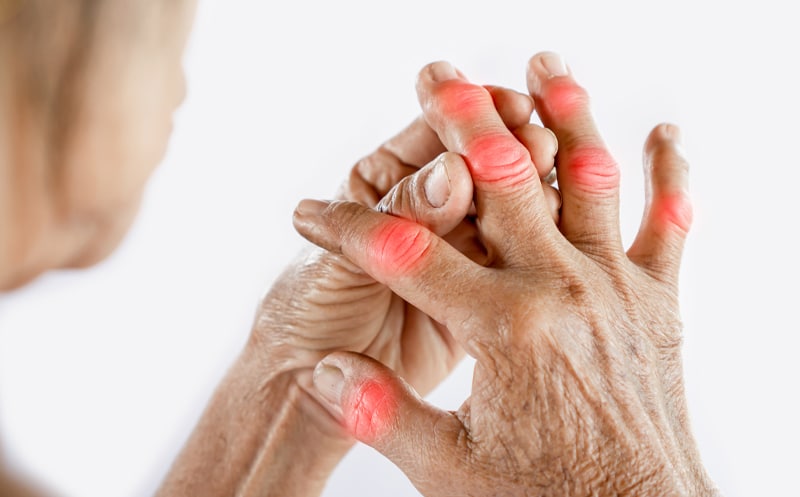index
Lupus, an autoimmune disease, affects fifteen times more women than men. This chronic condition can damage different organs and systems within the body. Because lupus symptoms are similar to other health problems, it can be challenging to get a proper diagnosis. Below, you will find information on how lupus is diagnosed, what causes lupus, lupus symptoms in women, lupus medication, treatments, and life expectancy.

What is Lupus?
Lupus disease, sometimes called lupus erythematosus, causes pain and inflammation. Skin sensitivity, damage to internal organs, joint pain, and other symptoms may vary daily. Systemic lupus erythematosus (SLE) can impact daily activities if symptoms are severe.
To better know about lupus, you must understand what an autoimmune disorder is and how it affects your health. An autoimmune disorder occurs when the immune system can no longer distinguish between bacteria, viruses, and healthy tissues and organs. As the immune system begins attacking and destroying healthy tissues and organs, several autoimmune disorders can occur, including lupus.
Lupus Risk Factors
One common question is, how do you get lupus? Lupus is an autoimmune disorder caused by the immune system attacking the body. Although the exact cause remains unknown, several factors can potentially increase your risk of developing SLE, including:
- Environmental Factors—Your environment can increase your risk of developing lupus. Excess sunlight can increase the risk. In addition, medications, stress, smoking, and viral exposure can increase your risk of autoimmune diseases.
- Family History—If you have a family member who has been diagnosed with lupus, you are at an increased risk of developing lupus.
- Sex—Women are at an increased risk of developing lupus than men. Researchers believe this could be due to hormonal changes. During the childbearing years, females are more likely to develop lupus.
Symptoms of Lupus in Women
Lupus disease affects everyone differently. In women, symptoms can develop over time or suddenly, range from mild to severe, and can be temporary or permanent. Most individuals who have lupus have mild symptoms that occur during flares. Once the flare passes, symptoms may improve or disappear entirely for some time.
The most common symptoms of lupus include:

- Butterfly rash that extends across the bridge of the nose to the cheeks
- Chest pain
- Confusion
- Dry eyes
- Fatigue
- Headaches
- Joint pain
- Joint stiffness
- Joint swelling
- Low-grade fever
- Memory loss
- Rashes
- Shortness of breath
- Skin lesions that occur with exposure to sunlight
How Does Lupus Affect the Body?
SLE lupus can affect different areas of the body. It can cause mild to moderate pain as well as cause serious complications to your organs. Some areas of the body impacted by lupus include:
- Blood—Lupus can cause issues in the blood. When you have a lupus flare-up, you may experience low blood platelets, red blood cells, or white blood cells. Low red blood cells can lead to SLE fatigue. Low white blood cells can increase the risk of serious infections. Finally, low platelet counts can cause easy bruising. Individuals with lupus are at an increased risk of blood clots, including deep venous thrombosis, pulmonary embolisms, and strokes.

- Brain—Although brain involvement is rare in lupus patients, it can cause several issues if present. Confusion and depression may occur. In addition to this, sufferers may experience seizures and strokes when the immune system attacks brain tissues.
- Eyes—Lupus can affect the eyes in various ways. The skin around the eyelids can change, dry eyes can occur, and the outer layer of the eyeball can become inflamed. Lupus can also cause changes in the blood vessels in the retina and the nerves that control eye movements. Thus, lupus can impact vision and lead to vision loss over time.
- Heart and Lungs—Lupus can cause the pericardium (the covering of the heart) or the pleura (the covering of the lungs) to become inflamed. When this occurs, you can experience fluid build-up around the heart (pericarditis) or lungs (pleurisy), irregular heartbeat, and chest pain.
- Joints—Arthritis is common in lupus patients. Arthritis can cause joint pain, joint stiffness, and joint inflammation. The joint pain may worsen in the mornings and ease during the day as you become more active. Lupus arthritis can last for a few days, or it can become chronic.

- Kidneys—Lupus can cause kidney problems, which can become life-threatening. Kidney disease may not cause any symptoms until it is pretty advanced, so it is imperative to have a lupus test if you have the symptoms of systemic lupus erythematosus.
- Skin—One of the common areas affected by lupus is the skin. Many women get lupus, or an autoimmune rash found across the bridge of the nose and the cheeks. You may also experience large red rashes anywhere on the body, which worsens when exposed to sunlight. You may also experience mouth sores and hair loss.
Treating Lupus
Doctors base the treatment for lupus on your symptoms, age, medications, general health, and medical history. The goal of lupus treatment is to put the autoimmune disorder into remission and limit the damage that occurs to the body.

Regular visits to a doctor specializing in autoimmune disorders are necessary as lupus can change with time. The unpredictable symptoms, changes in the intensity of your symptoms, and the chance of serious complications mean you must find a healthcare provider who understands this condition.
A functional medicine practitioner specializing in autoimmune diseases focuses on treating the body as a whole and utilizing its natural ability to heal itself. Doctors can manage lupus symptoms in women, and treatment involves reducing the frequency and severity of flare-ups.























